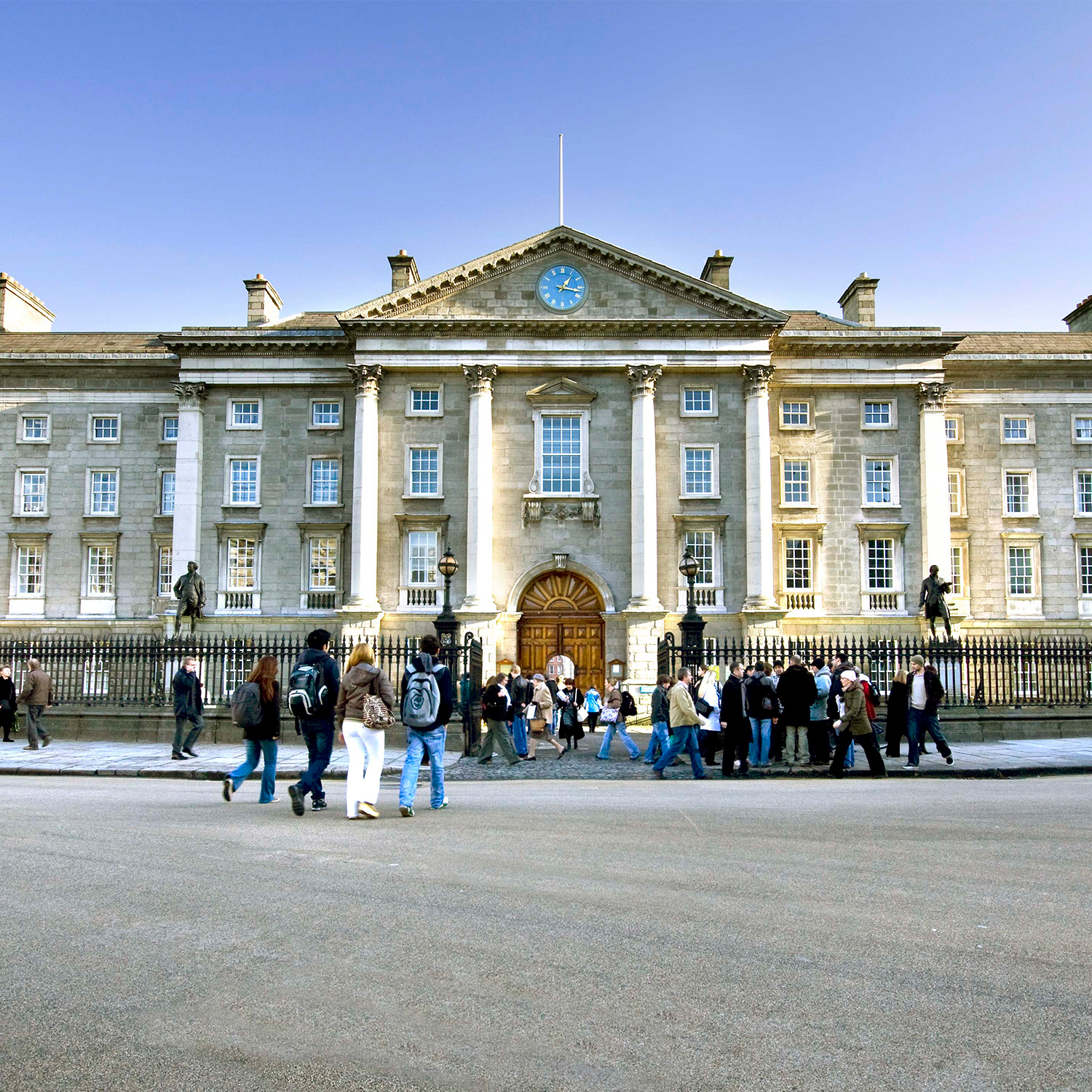Hungary
Hungary
Welcome to Trinity College Dublin, Ireland’s leading university. Prospective students from Hungary can discover more about Trinity including contacts and equivalent entry qualifications for undergraduate and postgraduate study below. You can also register your interest to find out more.
Undergraduate Requirements
Trinity is delighted to accept students who have completed the below qualifications from Hungary:
Recognised School Leaving Qualifications
Erettsegi Bizonyítvány/ Matura (NB NOT Erettsegi awarded by Szakkozepiskola see below).
Minimum Entry Requirements
Pass in 5 distinct recognised subjects including a minimum of 2 subjects at advanced level and 3 at intermediate to include English, Mathematics and another language.
English Language Competence
Please list of acceptable English Language qualifications.
Note: in addition to Matura applicants must submit a school report showing all subjects taken in final year.
Specific Course Requirements
This table shows what is required in terms of the Hungarian Examinations to meet specific subject requirements.
Subject Grade Comparison: NB NOT for points conversion - for this see separate table below |
|||
LC Higher |
Matura |
LC Ordinary |
Matura |
H1 |
5 Advanced |
O1 |
5 Intermediate |
H2 |
5 Advanced |
O2 |
4 Intermediate |
H3 |
4 Advanced |
O3 |
4 Intermediate |
H4 |
4 Advanced |
O4 |
3 Intermediate |
H5 |
3 Advanced |
O5 |
3 Intermediate |
H6 |
3 Advanced |
O6 |
2 Intermediate |
H7 |
2 Advanced |
||
Guideline Indicative equivalence with Irish Leaving Certificate points
As a guideline, it is anticipated that the indicative equivalence will be calculated as follows, counting the best 5 subjects and using only distinct recognised subjects.
|
|||||
Advanced |
Intermediate |
||||
|
Percent |
Points |
Percent |
Points |
|
|
100 |
110 |
100 |
94 |
|
90 |
104 |
90 |
85 |
||
80 |
101 |
80 |
76 |
||
70 |
99 |
70 |
70 |
||
60 |
94 |
60 |
63 |
||
|
55 |
89 |
55 |
59 |
|
50 |
84 |
50 |
55 |
||
|
45 |
78 |
45 |
51 |
|
40 |
76 |
40 |
47 |
||
35 |
73 |
35 |
42 |
||
|
30 |
72 |
30 |
36 |
|
25 |
71 |
25 |
30 |
||
20 |
70 |
20 |
24 |
||
A minimum of 5 subjects is required. However, a bonus can be given for a 6th subject so the maximum score of 600 (excluding bonus for maths) is attainable.
Single Sitting
All subjects are examined at the same time and points are calculated based on a single sitting.
Bonus points for maths: 25 additional points will be awarded for a grade 2 or better in Advanced level Mathematics where mathematics is one of the subjects counted for points.
Students who have not completed the above qualifications can apply using one of the international examinations recognized by Trinity.
Accepted qualifications for applications include:
In addition, to qualify for admission to a degree course at the University you must:
- Meet the minimum matriculation requirements (pass grades in English, Mathematics, a language other than English, and a full set of valid subjects for your examination system)
- Display a high level of competence in the English language in one of the examination systems recognised by Trinity College Dublin.
Details on accepted English proficiencies are available on our Admission Requirements page
- Satisfy course specific requirements. Some courses will have additional requirements and restrictions for admission.
They will be detailed on the relevant course page at and on our Admission Requirements page
- Meet competitive standards for admission to the course.
Please note that posted scores are minimum entrance requirements only and do not guarantee admission. Where places are competitive, a student must have excellent examination results to qualify for a place on their preferred course.
These standards are indicative only and final assessment will be made by Trinity's Academic Registry.
Important note on your application
Applicants from your country will normally be defined by Trinity as EU applicants; this is based on residency rather than nationality.
Your EU/Non-EU status is an important part of your application and it is your responsibility to determine your correct status before making an application, as the method of application and requirements will differ.
Determining EU/Non-EU status (Undergraduate)
Determining EU/Non-EU Status (Postgraduate)
There are many different ways to come to University and Trinity encourages applicants from all backgrounds and circumstances to apply. For more information on alternative paths to Trinity, such as advanced entry transfers,
please see our guide to non-standard applications here
Postgraduate Entry Requirements
Postgraduate work in Trinity is academically challenging and the University has high academic entry requirements.
Applicants will need to:
• hold at least a 2.1 honors degree from an Irish university or equivalent result from a university in another country.
Determining EU/Non-EU Status (Postgraduate) The fees you will be expected to pay to attend Trinity College Dublin are determined by a number of factors. For more information on how to determine your course fees, and methods of payment, please see our detailed information on Fees and Finances. Undergraduate Fees and Finances Postgraduate Fees and Finances For more information on scholarship, funding and grant opportunities, please see below. General Undergraduate Scholarships and Funding General Postgraduate Scholarships and Funding Do I need a Visa to come to Ireland to study at Trinity? Our EU Recruitment Team is here to help you find out more about Trinity College Dublin, through on campus Open Days, visits to Trinity with your school, assistance for your guidance counsellors and more.
For more information please see Visit Our Campus
If you have further questions about the application process you can contact the Applications and Admissions Team in Trinity’s Academic Registry
Email: academic.registry@tcd.ie
Phone +353 1 896 4500
• display a high level of competence in the English language in one of the examination systems recognised by Trinity College Dublin. Details on accepted English proficiencies are available on our Admission Requirements page
Some courses may require higher standards or require you to take further tests or attend an interview. More detailed requirements for each course are listed on the relevant course page
If you have questions about the specifics of the admission requirements for a given course, or about the course itself, you should contract the course coordinator directly using the contact information available on the courses page.Fees, Funding, Scholarships
Trinity College Dublin offers a number of scholarship opportunities for prospective and current students interested in study or research at Ireland's leading university. Since its foundation in 1592, Trinity College Dublin has sought to assist students of limited means and reward academic achievement. Students are always encouraged to explore external funding options in their home countries.Visas
EU/EEA/UK/Swiss students do not require a visa to study in Ireland. If you are unsure about whether you are an EU/EAA national, see here for a list of all EU/EAA countries.
For general information on visas and immigration please visit our Visa Information section.
Meet us in your country
Contact Details
Contact us
Click below to contact our Regional Managers for Europe. We are always happy to help answer questions about our programmes, entry requirements and student life.
Student Testimonials
-
 Julia CarrollEnvironmental Science
Julia CarrollEnvironmental Science
IrelandI've always wanted to study at Trinity because studying at the heart of Dublin city centre always appealed to me. I've always felt drawn to the historical campus, my mother and older sister studied at Trinity, and my parents were married at the chapel in Front Square! When I visited the campus for the first time and walked around the magnificient buildings, I knew Trinity was the place for me.
-
 Kevin MurphyMFA Stage Design
Kevin MurphyMFA Stage Design
IrelandI chose to undertake the MFA in Stage Design in order to further my creative practice, to spend a full year working on my design abilities and to develop the skills necessary to be a successful lighting designer after the course. It was great to have an established professional there to see how you work, give you feedback, and to see how your development over the course of the programme. I also really enjoyed that the MFA in Stage Design is primarily project-based which makes the course very practical and allows you to work on your skills in real time.





